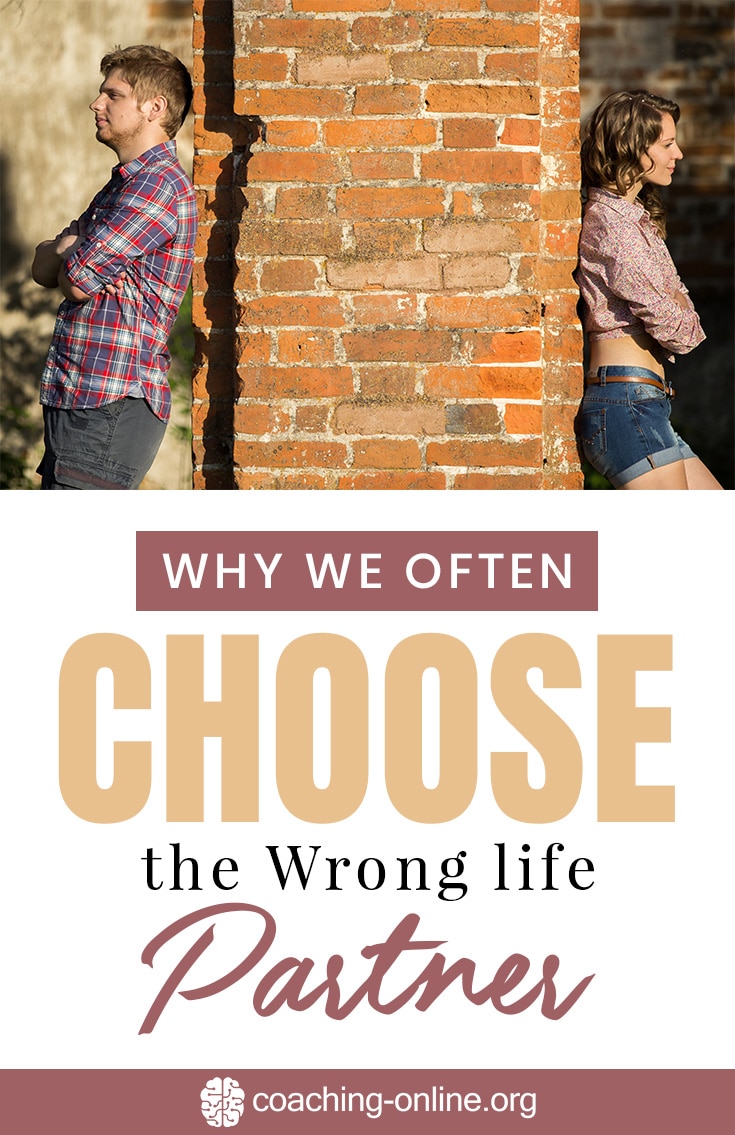Why We Often Choose the Wrong Life Partner
Our choice of a life partner is no doubt one of free will independent societal influence or some primitive match-making authorities.
It’s no denying that the marriage institution has come a long way from the archaic influence of society and family to one in which we are actually free to choose who we love.
In theory, this seems to be the notion but in reality; our choice is still influenced by certain constraints we might have failed to notice.
Our decision-making process seems a lot less free than we’ve believed it to be. Our childhood experience turns out to be one of these less explored influences on our choice of who to love.
Certain experiences during our childhood would later go on to influence those attractions that appeal to us in a partner.
Our choice of who to love and the various points of attractions may have found their roots in an unlikely place. More and more, we are beginning to understand the powerful impact of childhood on our general outlook on life.
As we’ll see, here again, these experiences undoubtedly have an overbearing influence on who we choose to love.
So, could it be that the deficiencies in our childhood are responsible for why we choose the wrong partner? This is the exact thing we shall be discussing in today’s blog.
- Childhood Experiences Influence Our Idea of an Ideal Life Partner
- The Problems of Our Childhood in Our Response to Compelling Characters
- Managing Our Psychological History In Relation to Reality
- Reflecting on Our Childhood Defensive Moves
Childhood Experiences Influence Our Idea of an Ideal Life Partner
The role our psychological history plays in our choice of the ideal partner is much more than we seem to notice.
The summation of these experiences is what shapes the choice and type of people we love and fall for.
Our childhood love experience is the ultimate template on which these ideas are formed.
Unknowingly, we are always searching for those people who can recreate these feelings of love we are used to.

On the other hand, the love we’ve experienced as children is highly unlikely to have been wholly made up of generosity, tenderness, and kindness. Just like the world is, this would have come at some points with painful aspects.
These may be one or more of a feeling of not being good enough; a childhood love for a fragile or depressed parent; a sense of protection and invulnerability around a caregiver, among a host of other predispositions.
All of these are responsible for configuring our idea and choice of the ideal person. This no doubt can result in us choosing the wrong life partner.
When the time comes to make a choice, rather than focus on someone who would be kind to us, we are most importantly looking for the one who feels familiar.
We tend to associate a lot of complexities with love that we often look away from prospective and worthy partners in our yearning for this familiarity.
People who are not able to satisfy these cravings are termed ‘’boring’’ or ‘’not sexy’’ among different tags. In reality, this could have meant that they are unable to make us suffer in the way they should before we feel that their love is real.
These yearnings are partly responsible for the reasons behind why we choose the wrong life partner or why it seems we have done so.
The Problems of Our Childhood in Our Response to Compelling Characters
Our problem stems from our continuous response and behavior to compelling characters the same way we did as children when the templates for such characters were being formed.
Take for example one who has to deal with an irate parent who would usually raise their voice. We still loved them; with our response and reaction being that they were angry because we must have been guilty. We thus become humbled and timid.
Now, when our partner to whom we were attracted to gets cross, our psychological history then manifests. We sulk and feel squashed, we feel guilty and deserving of criticism and we then tend to build up resentment.
Perhaps we had a vulnerable or fragile parent who gets hurt easily and had ended up with a partner who seems weak and demands that we care for them, but then we end up becoming frustrated with their weakness.
While we try to work around this by reassuring and encouraging them as we did when we were young, we are also likely to condemn these persons for being undeserving. Unknowingly, these templates of attraction may have led to our choosing the wrong life partner.

Managing Our Psychological History In Relation to Reality
People who have been drawn to seemingly wrong life partners are often simply advised to look for more wholesome choices.
While this may seem appealing in theory, it is often not practically possible. Redirecting our source of attraction is almost impossible.
Rather than trying to change the type of people we seem attracted to, it will seem easier to try and adjust our response and behaviors to characters that our past has made to appear compelling.
While it is quite an effort to re-engineer our instincts or change our templates of attractions, we should rather try to respond to compelling characters in a constructive and more matured manner of a rational adult, different from how we handled these as children.
There is that possibility to progressively move from the childlike patterns we’ve been configured to; to a matured adult pattern of response when we are faced with these compelling characters.
If you had tough episodes in your past, consider hiring a life coach for help.
Related Articles on Self Confidence
Reflecting on Our Childhood Defensive Moves
Looking at it, we’d almost certainly encounter someone with one or more particularly challenging series of characters. These behaviors would usually trigger our desires, setting up our childhood defensive moves.
The answer here is neither to end the relationship nor to continue responding like we use to do. Rather, we’ll be better off dealing with these challenges with the wisdom and maturity which we lacked when we first saw them in a parent or our caregiver.
Rather than raise our voices in response to a partner’s tricky or challenging behavior which ultimately leads us to a sense of guilt, maturity and wisdom should let us understand that this may just be their own personal issue that shouldn’t make us feel bad.
Rather respond to a patronizing partner in patters similar to ’’Oh! I’m so stupid’’, a more matured response like ’’We’re intelligent in different ways and mine is fine’’ would seem appropriate.
While we may not be expected to bear the burden of locating a wholly grown-up person in our bid to avoid choosing the wrong life partner, it is always within our capacity to respond in more matured or grown-up ways to those sides of our partners that may seem less-matured.
As elaborately discussed in this video on YouTube, our matured response to our partner’s compelling character rather than quitting would make a difference in correcting these little-known psychological imbalances that may have affected our childhood up until this point.
Important Note
Every article I write is intended to help you with:
- questioning and reflecting on your own view of the world
- understanding why you are looking at the world like you do
- finding different perspectives to view situations from different angles, and
- going on a meta-level and reflecting on the consequences of your view
However, with every sentence I write, I create another view of how things “really are”. Even if I do this with the best intentions, please critically examine if this construction of the reality is helpful for you as an individual person in your own special situation.

